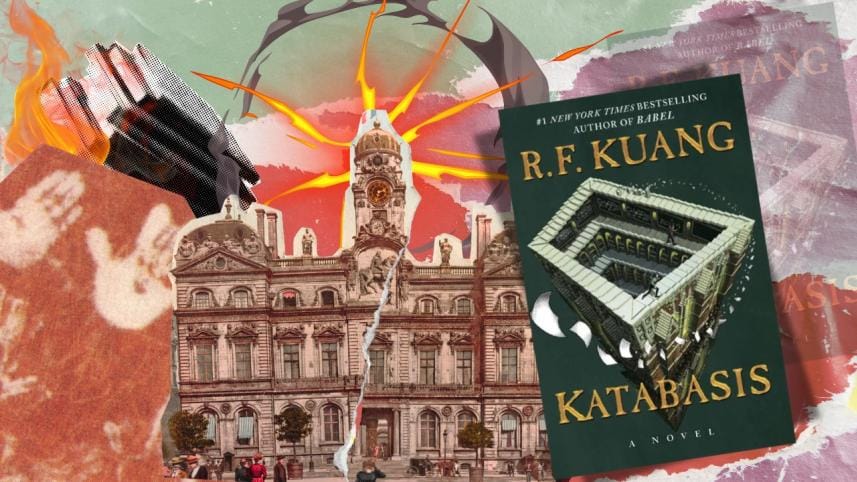Abandon hope, all ye who enter grad school

If Dante Alighieri were a frustrated PhD student with a caffeine addiction and a strong disdain for university bureaucracy, he might have created Katabasis, as R.F. Kuang did. This work is a hilariously realistic satire of the voyage through the nine circles of hell, but with a terrifyingly familiar twist: hell is a campus. Forget lakes of fire and forests of suicide; the ultimate pain is an infinite library, a student union of eternal addiction, and the soul-crushing, silt-covered dunes of academic purgatory.
In Katabasis, Kuang transforms the ivory tower into a bureaucratic inferno, proving that eternal torment looks suspiciously like graduate school. Consider the fluorescent hum of a never-ending academic library, stacks of manuscripts citing each other into oblivion. It is a novel where the descent into the underworld is indistinguishable from postgraduate life.
At its centre is Alice Law, a postgraduate in Analytic Magick at Cambridge—a discipline where chalk and paradox do what most fantasy novels would leave to swords and spells. Alice embodies the striving scholar: anxious, furious, determined, and painfully aware that the system was never built for her. Alice's future disintegrates when her monstrous yet indispensable advisor, Professor Grimes, dies in an accident that is both her fault and her curse. A career without his glowing recommendation? Impossible. Her solution: descend into hell itself to retrieve his soul. She is unwillingly paired with her rival, Peter Murdoch, the sort of student who can glance at a pentagram and see the theorem hidden within—a golden child whose brilliance is both dazzling and intolerable.
Kuang's reimagining of hell is her boldest satire. Pride becomes an infinite library where 'shades'—bodiless souls who are waiting to pass through every court of hell—are forced to define "the good" until they calcify into statues. Desire manifests as a grimy student union room, its prisoners trapped in eternal cycles of compulsive craving.
Their uneasy partnership is the novel's spine. Alice grinds, Peter glides. She bleeds for her work, he flicks his wrist and triumphs. The friction between them is not romance—thank heavens Kuang avoids that trap—but the raw tension of two minds who know the system will crown one and discard the other. Their descent together into the Eight Courts of Hell is, in effect, a viva stretched across eternity, with the stakes not just careers but souls.
Kuang's reimagining of hell is her boldest satire. Pride becomes an infinite library where 'shades'—bodiless souls who are waiting to pass through every court of hell—are forced to define "the good" until they calcify into statues. Desire manifests as a grimy student union room, its prisoners trapped in eternal cycles of compulsive craving. Bureaucracy appears not as a horned demon but as endless paperwork, waiting rooms, and departmental meetings that feel eerily close to real life. The result is both hilarious and horrifying: a hellscape constructed not from fire, but from the lived experience of academia.
And yet, beneath the humour, the novel burns with something darker. It asks what happens to the self when ambition consumes everything else? Alice's journey is less about saving Professor Grimes and more about confronting the monstrous truth of a system that feeds on sacrifice—of time, health, ethics, identity—while offering nothing in return but the faint shimmer of prestige. In this sense, the novel is less fantasy than mirror: it reflects the institutional cruelties of the ivory tower until the satire feels almost too sharp to laugh at. Kuang's background as a scholar is her secret weapon. The magic system—based on paradox, translation, and linguistic sleight of hand—is as intellectually dense as it is original. Her footnotes, digressions, and mini-lectures on reincarnation or logic are not decorative; they embody the very excesses she lampoons.
At times, the novel seems to become the dissertation it critiques: a text so eager to explain that it risks drowning the reader in theory. But this is part of its design. Hell is boredom. Hell is bureaucracy. Hell is the endless paper that no one reads.
Still, when the novel moves, it moves like lightning. Kuang skewers the job market, the negligent advisor, the cult of performative suffering, all with razor-sharp wit. Alice's internal monologue is a masterpiece of anxious self-sabotage, and Peter's effortless superiority is rendered with just enough vulnerability to prevent him from becoming a caricature. Together, they embody the brutal economics of academia: one climbing endlessly, one born already at the summit, both trapped in a system that values neither fully as human beings.
Finishing Katabasis leaves the reader wrung out, as though they, too, have paid half their lifespan to sit through the ordeal. It is exhausting and infuriating in equal measure. The final impression is not despair but recognition–the realisation that the university, for all its grand ideals, too often resembles the inferno more than the paradise it promises.
If one needed a soundtrack to the novel, it would be BTS's "N.O.", with its defiant cry against the treadmill of study, work, repeat. Alice and Peter's journey is precisely that refusal made mythic: a rebellion not against hell, but against the ivory tower itself.
R.F. Kuang has always been a writer of ambition. With Katabasis, she proves to herself that this is not escapism. It is satire with teeth, a novel that forces its readers to look up from the chalkboard and ask what their own souls are worth. In the end, hell is not other people. Hell is the campus.
Nazmun Afrad Sheetol is an International Relations graduate, a Substack writer, and a contributor at The Daily Star. She can be reached at sheetolafrad@gmail.com.



 For all latest news, follow The Daily Star's Google News channel.
For all latest news, follow The Daily Star's Google News channel. 
Comments